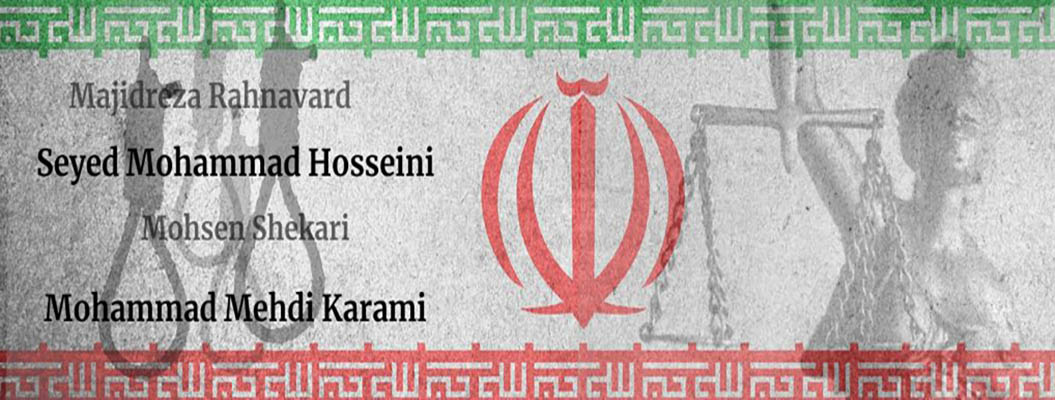Iran: IBAHRI calls for stop to planned executions and sham trials and for UN investigation into ‘suicides’
Wednesday 1 February 2023

The International Bar Association’s Human Rights Institute (IBAHRI) reiterates its call for the authorities of the Islamic Republic of Iran to halt immediately any ‘trials’ and planned executions of protestors, including that of Mohammad Ghobadlou, who is at imminent risk of execution. Furthermore, the IBAHRI calls on the United Nations to investigate a spate of reported suspicious ‘suicides’ amongst protestors.
Ghobadlou is 22 years old and reported to have a mental disability. Under international law, this should preclude him from receiving a death sentence.
From 8 December 2022 to 7 January 2023 the Iranian authorities have put to death dissidents exercising their rights to protest, including the below listed. Ages are bracketed. All were accused and charged by the state with ‘Moharebeh’ (waging war against God), inter alia. It is reported that the executions took place less than two months after their arrests and in some cases without their families being informed.
- Majidreza Rahnavard (23)
- Mohammed Mehdi Karami (22)
- Mohsen Shekari (23)
- Seyed Mohammad Hosseini (39)
Appeals against sentences failed and reported claims of being tortured into making false confessions were unheeded. In the case of Karami, it was reported that before he was executed, he had been on hunger strike for four days in protest against being denied access to his lawyer, who was blocked from representing his client in court and appealing the sentence.
IBAHRI Director Baroness Helena Kennedy KC commented: ‘The politically charged nature of these cases, the denial of access to adequate legal representation, the use of vaguely worded criminal provisions, the expedited rate of the proceedings and executions, and the visible signs of torture leading to forced confessions of the defendants are all emblematic of the Iranian authorities’ attempts to instil a chilling effect in protestors. It is clear that the Iranian Revolutionary Courts have been weaponised to target political dissidents and those exercising their human rights. The infliction of all these cruel, inhuman and degrading punishments on dissidents and arbitrary state killings demonstrate the Iranian authorities’ complete lack of respect for human rights and the depth of the regime’s fear to face accountability by its own people.’
According to reports, judges at the Iranian Revolutionary Courts routinely abuse their legal powers, particularly in ‘security-related’ cases such as those involving human rights, political dissidents and civil activists. The Courts are cited as frequently denying access to legal representation during the investigation phase and preventing lawyers from obtaining their clients’ files on the basis of confidentiality or claims that lawyers have insufficient ‘qualifications’ to review certain documents.
Denying lawyers access to client files and the time then taken-up battling authorities for access, hampers and restricts lawyers which results in insufficient time to prepare and provide their clients with an adequate defence.
IBAHRI Co-Chair Anne Ramberg Dr Jur hc stated: ‘The IBAHRI calls on Iran’s authorities to end unfair trials and for a moratorium on all planned executions, as well as the release of all prisoners detained for participating in demonstrations. With Iran’s Revolutionary Court issuing the majority of rushed and arbitrary executions, it cannot be viewed as anything other than acting at the whim of the Iranian Revolutionary Guard. Justice in Iran is an illusion. Power is unchecked, resulting in impunity. A system that cannot ensure accountability, sits at the opposite end of the judicial independence spectrum. The executions of protestors in Iran are the ultimate form of repression and the IBAHRI condemns them, in Iran and wherever they are carried out.’
Lawyers in Iran also face systematic pressure, threats, harassment and arbitrary arrests while carrying out legitimate work-related activities. In a Twitter post, Hosseini’s lawyer alleged that Hosseini had been subjected to torture and had visible marks on his body from beatings. Following the Twitter post, Hosseini’s lawyer was arrested by security forces for publicly reporting on his client’s condition.
IBAHRI Co-Chair Mark Stephens CBE commented: ‘The IBAHRI draws the Iranian authorities attention to the UN Basic Principles on the Role of Lawyers in particularly the first and 16th provisions that hold that all persons are entitled to be represented by a lawyer of their choice, and that governments should ensure that all lawyers are able to perform their professional functions without intimidation, hindrance, harassment or improper interference. These rights have been consistently disregarded by the Iranian Courts throughout these trials. Combined with the vagueness of charges that carry mandatory death sentences, it reveals a thinly veiled mockery of criminal justice. Furthermore, the IBAHRI urges all UN Member States to call for a halt to all further killings of protestors and to investigate suspicious ‘suicides’ amongst protestors that have appeared in media reports.’
There have been reports that a number of people arrested in relation to the current protests have been found dead in their dwellings or killed themselves after release from detention. Families of some of the deceased are stating that some ‘suicides’ have been staged, while others are citing severe torture and forced injections of unknown drugs during detainment that led to extreme anxiety.
The IBAHRI is further concerned by the news that some countries, including Turkey, are deporting Iranian refugees, who participated in previous protests, back to Iran. Germany has called for halt to any planned expulsions to Iran.
In a 10 January 2023 statement, the United Nations noted that at least 17 others have been sentenced to death since the start of the ongoing nationwide anti-government street protests that erupted following the death of Mahsa Amini while in police custody after being arrested for not wearing a headscarf in a way deemed ‘appropriate’ by Iran’s ‘morality’ police.
ENDS
